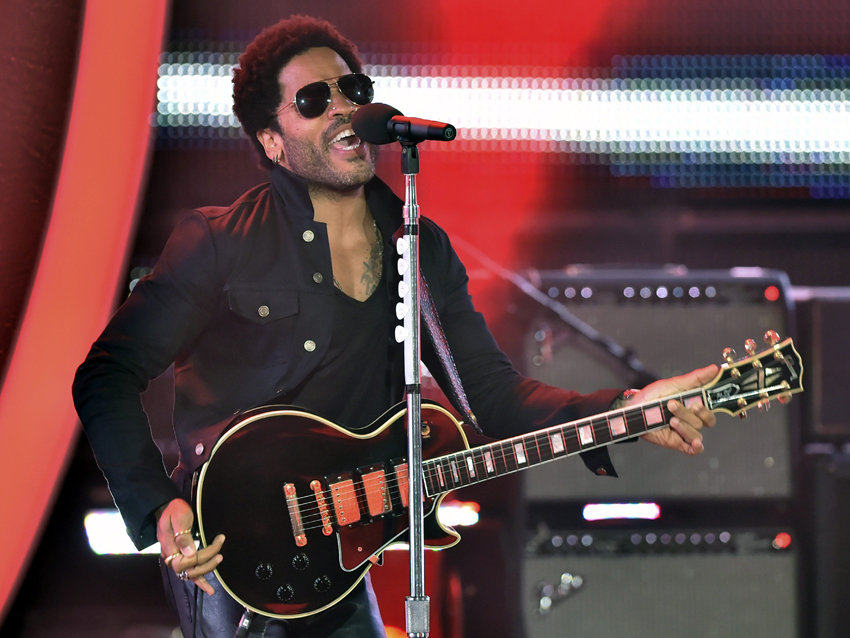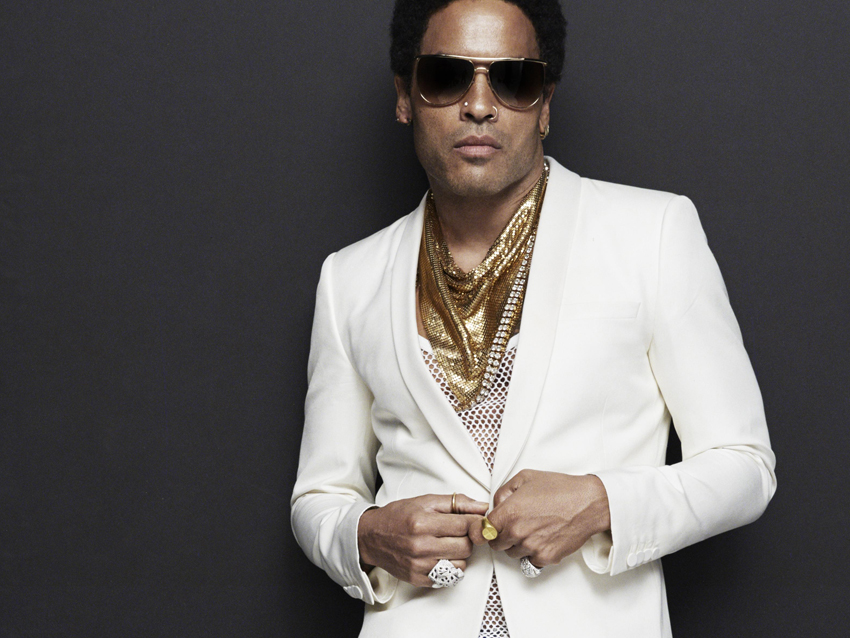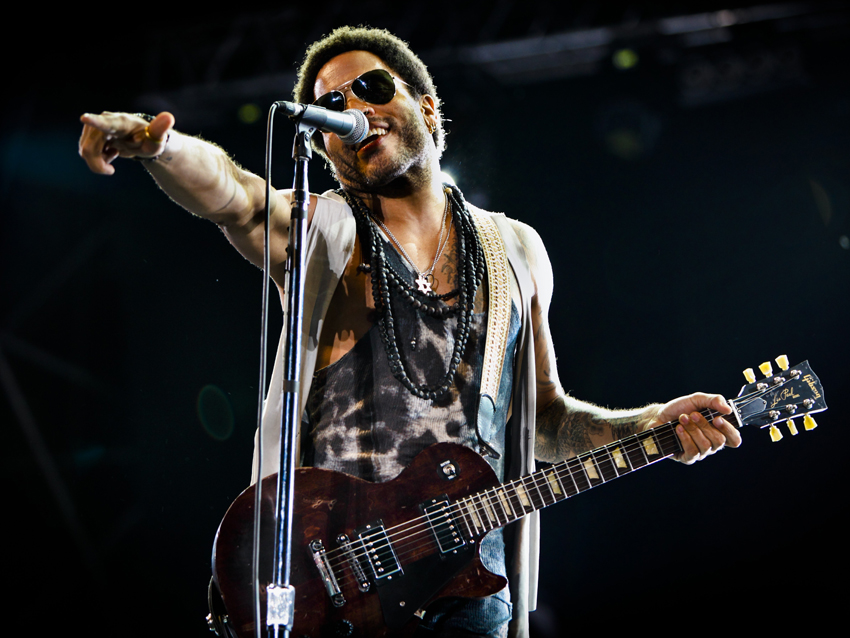
Lenny Kravitz on revamping his songwriting for new album Strut
Lenny Kravitz had no clue that he would start writing his new album, Strut, while filming his scenes for last year’s The Hunger Games: Catching Fire. He brought no recording gear or instruments with him on location, so he captured his ideas the only way he could – humming melodies and grooves into his iPhone.
"It was as simple and as immediate as that," he says with a laugh. "I would film all day, and then I'd stay awake all night working on music. I did that for two weeks straight. Stuff just started coming to me, so I had to make an effort to capture it." The process was an invigorating one, Kravitz observes, and it reconfirmed what he had always believed about music: "That you can't just sit down to write music – at least I can't. I wait until I hear it. For me, music comes when it wants to."
In the following interview, Kravitz talks about recording Strut and how it brought about a dramatic change to his songwriting approach, as well as his thoughts on the future of the album format. (You can purchase Strut at iTunes or on Amazon.)
In the press notes for Strut, you said that it's "a real rock 'n' roll record." I never got the notion that you had turned your back on rock.
“No, no, I haven't. The main thing is, this one is very focused on guitar, bass and drums. The production is pretty minimal. No, I think that whatever I’ve done has always had the spirit of rock ‘n’ roll in it. I’ve always been very guitar driven, whether it’s been on the funky side or the rock side or whatever.”
The role of the album, the future of the format, is in flux these days. What are your thoughts?
“I believe in the album format – absolutely. When I make a record, that’s what I’m thinking about. I mean, I’m not thinking, ‘Let’s make a record,’ but at the same time I am aware of what I'm doing. 'This group of songs – how do they fit together? What story do they tell as a whole?' The arc of the songs, the spacing between them, all of that – I’m thinking in the album format, most definitely.
“Albums are important to me. That’s what I grew up listening to. Yeah, sure, you can drop singles, and that’s been going on since the beginning. The Beatles, the Stones – everybody did that. They made amazing singles. They’d put out singles between their albums, and they were great.
“Some artists today put out albums that don’t feel like albums. You have a collection of songs, but where’s the thought that brings them together? Sometimes there’s this producer and that producer and this producer, or sometimes there’s even multiple producers, and then they put all the songs together and call it an album. I don’t know – that’s not an album to me.”
A couple of weeks ago, U2 released their new album for free on iTunes, a move that polarized music fans. You toured with the band a few years ago. Do you have any thoughts on the whole matter?
“Yeah, I don’t know. People are very particular about their iTunes and their playlists. I guess if a lot of people did that, it would be an overload. But the band did what they did… I can see both sides to it, really.”
You changed your songwriting radically for this album, writing down titles based on the way the music sounded.
“That's right, and you know, I’d never done that before. That was something completely new for me. I thought it was an interesting exercise in capturing the first impression and staying with it. Sometimes you have to trust your gut or your instinct. I would cut each track, and after I had the rhythm track – the drums, bass and guitar – I’d sit down and listen to it. There was no melody, no extra overdubs, just three instruments. Whatever word or feeling I got from the music is what I named it.
“Normally, those are just working titles you have for identification, so that when you’re working you can tell the engineer, ‘OK, today we’re going to work on this,’ and he knows what it is. You give it some kind of title, even if you’re going to change it later. In this case, I thought it was interesting to stick with the original titles, so that’s what I did.”

On titling a song "Happy Birthday"
Before this album, were you a title or lyrics guy first?
“No, I’m usually a groove or melody guy first. Normally.”
You played most of the instruments on the record, although a few people appear on a couple of tracks – Craig Ross, Tom Edmonds. Normally, how do you lay down the tracks?
“It’s usually drums, guitar and then bass. I start with those three, and then if I have another guitar or whatever, or if Craig plays some guitar or if there’s keyboards, percussion or other overdubs, strings, all of that comes later. That’s usually the order of things.”
You recorded the album at your studio in the Bahamas. Are you still using analog gear still?
“Yeah, absolutely. I record either to tape or I go to Pro Tools. I go through a lot of tape.”
You named one of the songs Frankenstein because of the way it sounded, but when you wrote the lyrics, were you guided by the story at all?
“I was. Yeah, it started with the music and then there was the title, but I thought of the movie and about him, the monster. That was one of my favorite movies as a kid; I was into all of those monster movies – Dracula, the Wolfman, Bela Lugosi and Lon Chaney and all those folks. I always felt for the guy, the Frankenstein monster, and how unfairly he was treated. It made me start to think about misunderstandings, misunderstood love – even though he was a monster, he wanted to feel love and be loved.”
When you write a song called Happy Birthday, are you thinking at all about coming up with a standard? The Beatles have Birthday, Stevie Wonder has his own Happy Birthday, and of course, there’s the traditional song. Those are some pretty tough benchmarks to shoot for.
[Laughs] “You know, you can’t think about it, although I did think it was odd that I was writing a song with that title. I thought it was either going to be super-cheesy or it could be good. But I wasn’t envisioning that it would be a standard or anything like that, although hopefully it’ll be used in some way. We’ll see.”

On reducing his options
What were your go-to guitars for this album? Are you using anything new?
“Nope, nothing new. I used two guitars and one amp on the entire album. I used my goldtop Les Paul, an old one. It’s faded now, so it’s like this weird greenish-brown color. That’s my number one guitar. And then I also used a three-pickup black Custom. That was it. The amp was a Blackface Fender Deluxe. I had it modified by Dumble, and it’s the sickest amp I’ve ever heard.
“I like trying to keep things simple. On every track, I was able to get different sounds with only a few instruments. It’s just easier to keep things simple, especially when you’re moving at a fast pace. We set up a couple of things and had ‘em ready to go.”
You do get some varied sounds out of just those couple of guitars. The guitar on the song Sex doesn’t sound like a Les Paul.
“Actually, that’s Craig on that one. He was playing a Strat. It was an old one – I’m not sure what year it is. It was borrowed from somebody. [Laughs] There’s a great phase pedal on it. It’s a cool sound.”
You end the record with a cover of Smokey Robinson’s Ooo Baby Baby. Is it daunting to tackle a classic like that, knowing full well that nobody can sing Smokey better than Smokey?
“I’m definitely doing it with the utmost respect – absolutely. I put my own spin on it, and I think I respected the original. At the same time, you’ve gotta deliver. You’ve got Smokey, you’ve got Linda Ronstadt – you’ve got people who did that song very well. But I was happy with how the tune came out, and it felt right to me. That's all you can go on.”
Joe is a freelance journalist who has, over the past few decades, interviewed hundreds of guitarists for Guitar World, Guitar Player, MusicRadar and Classic Rock. He is also a former editor of Guitar World, contributing writer for Guitar Aficionado and VP of A&R for Island Records. He’s an enthusiastic guitarist, but he’s nowhere near the likes of the people he interviews. Surprisingly, his skills are more suited to the drums. If you need a drummer for your Beatles tribute band, look him up.
